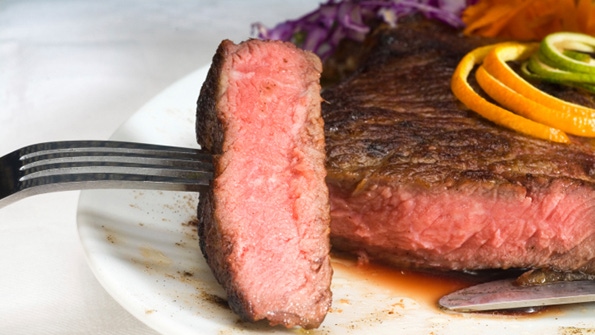New research from the Harvard School of Public Health found a link between eating red meat and risk of early death. Newhope360 talks with study co-author Qi Sun, MD to find out what this means for consumers.
April 2, 2012

Chalk one up for vegetarians. According to a first-of-its kind study of more than 121,000 health professionals conducted over 28 years, the more red meat you eat, the greater your chances of dying early from cancer, heart disease or another chronic illness.
The controversial study, published in March in the Archives of Internal Medicine, linked each daily single serving of unprocessed meat with a 13 percent increased risk of early death. If the meat was bacon, bologna or other processed offerings, mortality risk spiked 20 percent. On the flip side, replacing one serving of red meat per day with fish, poultry, nuts, dairy or whole grains appeared to reduce death risk by 7 percent to 19 percent. If everyone ate less than a half-serving per day of red meat, the authors concluded, the deaths of 9.3 percent of the men who died during the study and 7.6 percent of the deceased women could have been prevented.
We asked study co-author Qi Sun, MD, a research associate at the Harvard School of Public Health, about the research.
newhope360: Why did you to do this study?
Qi Sun, MD: Previous research has shown that red meat consumption is associated with a significantly increased risk of Type 2 diabetes, cardiovascular disease and certain cancers. But the question that remained was, "Does it increase risk of early death?"
newhope360: How did you do it?
QS: We analyzed data from the Health Professionals Follow-up Study (which involved 37,698 mostly white, non-Hispanic men age 40 to 75) and the Nurses' Health Study (which included 83,644 mostly white, non-Hispanic women age 30-55). We evaluated everyone's red meat consumption by having them fill out a questionnaire and followed them for 22 to 28 years, updating their information every two to four years. We then ranked them into five categories, with the highest quintile eating 2.4 to 3.1 servings per day and the lowest eating less than half per day.
newhope360: What did you find?
QS: When comparing the highest to lowest quintiles, the red meat consumption was associated with a 30 percent or more increase in mortality. The higher the red meat consumption, the higher the mortality risk. Processed meat was associated even more strongly with mortality risk.
newhope360: People who ate more red meat were also "less likely to be physically active and more likely to smoke, drink alcohol and have a higher body mass index." Could that be what is increasing their mortality?
QS: We controlled for those variables in statistical analysis, so the observed associations are independent of them.
newhope360: How does red meat cause disease?
QS: Red meat is a strong contributor of saturated fat and cholesterol, which are risk factors for cardiovascular disease. It is also a major contributor of dietary iron, particularly heme iron, which is a risk factor for developing Type 2 diabetes. Processed meat is also rich in sodium and nitrates. High sodium consumption can increase blood pressure, and nitrates are associated with impaired endothelial (blood vessel) function and insulin response.
newhope360: What about cancer?
QS: People tend to use very high temperatures when cooking red meat, and some carcinogenic compounds are produced during that cooking. Heme iron and iron overload might also be associated with increased cancer risk.
newhope360: Is organic or grass-fed meat less harmful?
QS: This is a very good question. In the questionnaire we did not further separate red meat sources, because our cohort started in the 1980s when those kinds of products were not broadly available. There is some research suggesting that grass-fed beef is higher in polyunsaturated fatty acids, which are beneficial in terms of cardiovascular disease and Type 2 diabetes. It is a question we will keep in mind for future study.
newhope360: Should people stop eating red meat?
QS: We are not saying don't eat red meat at all. We are just saying pay attention to how much. If you eat 2 to 3 servings per week or less, your risk of mortality is not going to be increased substantially. If you eat more than that, you can replace red meat with healthy protein sources and your risk of developing chronic diseases is going to be lower. Also, pay attention to your cooking methods and keep very high-temperature cooking like barbecue to a minimum.
For another perspective, see what Science Writer Gary Taubes thinks about the study

About the Author(s)
You May Also Like




